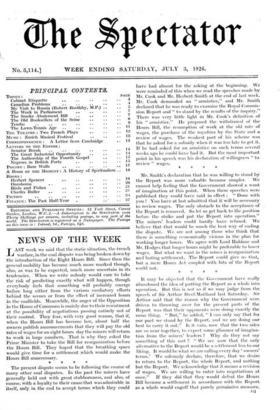The present dispute seems to be following the course of
many other coal disputes. In the past the miners have generally held out with great stubbornness, and also, of course, with a loyalty to their cause that was admirable in itself, oily_ in the, end to accept terms. _which they could have had almost for the asking at the beginning. We were reminded of this when we read the speeches made by Mr. Cook and Mr. Herbert Smith at the end of last week. Mr. Cook demanded an "armistice," and Mr. Smith declared that he was ready to examine the Royal Commis- sion Report and "to stand by the results of the inquiry." There was very little light in Mr. Cook's definition of his " armistice." He proposed the withdrawal of the Hours Bill, the resumption of work at the old rate of wages, the purchase of the royalties by the State and a review of wages. The weakest part of his scheme was that he asked for a subsidy when it was too late to get it. If he had asked for an armistice on such terms several weeks ago he could have had it. But the most important point in his speech was his declaration of willingness " to review" wages.










































 Previous page
Previous page